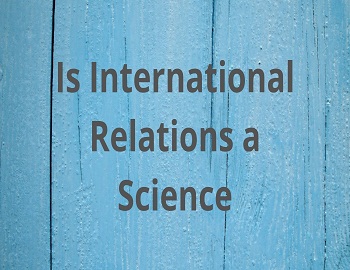Is International Relations a Science
Whether International Relations is a science or art is still open to great controversy. According to Quincy Wright, “International Relations is a field extraordinarily difficult for science to enter”. Prof. Organski, on the other hand, regarded it as a science. According to Prof. Organski, “there are unquestionable ways in which a scientific approach to International Relations has proved and will continue to prove highly useful”. In fact, there are great doubts expressed by competent authorities in regard to calling it a science. However, to solve this controversy we must inquire into what constitutes science. This will enable us to form an intelligent opinion on the subject.
The Meaning of Science- A science has been defined as a “branch of knowledge or study dealing with a body of facts or truth systematically arranged and showing the operational or general law”. The chief characteristics of science are-
- Predictions.
- An agreement on the method.
- Experimentation.
- Observation.
- Rationality.
According to Garner, “A science may be described as a fairly unified mass of knowledge relating to a particular subject acquiring by systematic observation, experience or study the facts of which have been co-ordinated, systematized and classified”.
International Relations not as a Science- Those who believe that International Relations is not a science hold the view that this subject does not fall under any of the definitions of science. Like other physical sciences, its knowledge is not systematic and its results are not universal or uniform. Also, writers on International Relations differ in both methods and conclusions. Also like other physical sciences, its conclusions cannot be experimented. Predictions in International Relations are also not possible. According to Quincy Wright, “The internal stability of most states and their external independence has been diminished by the shrinking of the world with the consequences that predictions based on political knowledge have become progressively less reliable”. Also, the claims of International Relations as science are ruled out on the ground that like physical sciences it has neither laboratory nor objects for experimentation. As a science, it falls short of the degree of perfection attained by physical sciences.
International Relations as a Science- There are other writers who strongly feel that International Relations is definitely a science. According to Organski “most of serious writing in the field of International Relations meets the requirement of scientific approach”. These writers and thinkers do not agree with the view that political science has no laboratory and there is no experiment that is possible to be carried on here. They also do not agree that the study of International Relations is unsystematic. On the other hand, they believe that this universe is the laboratory where experiments can be made. As such many thinkers treat International Relations as a science.
International Relations as an Art- There is still another group of thinkers that treats International Relations as an art. But before we establish its place among arts, it is essential to know the meaning of art. Art is defined as “actual experimentation of the results of science”. Art gives practical directions for doing things in a particular way. Art implies, according to Quincy Wright, “the skilful and systematic adaptation of means for the attainment of some end”.
In International Relations we find a good deal of tinge of art because what we decide, study and conclude is put into actual practice. Diplomacy is the most characteristic of such arts. The art of war is second to diplomacy in the practice of International Relations.
Conclusion- In this controversy, much confusion has arisen. We have seen that in International Relations there are characteristics both of science and art. We cannot put it on the same footing as other physical sciences. However, we conclude with Prof. Organski that, “As a science, International Relations today is in its infancy. In its present stage it is less a science than a mixture of philosophy, history and art”.









Comments (No)